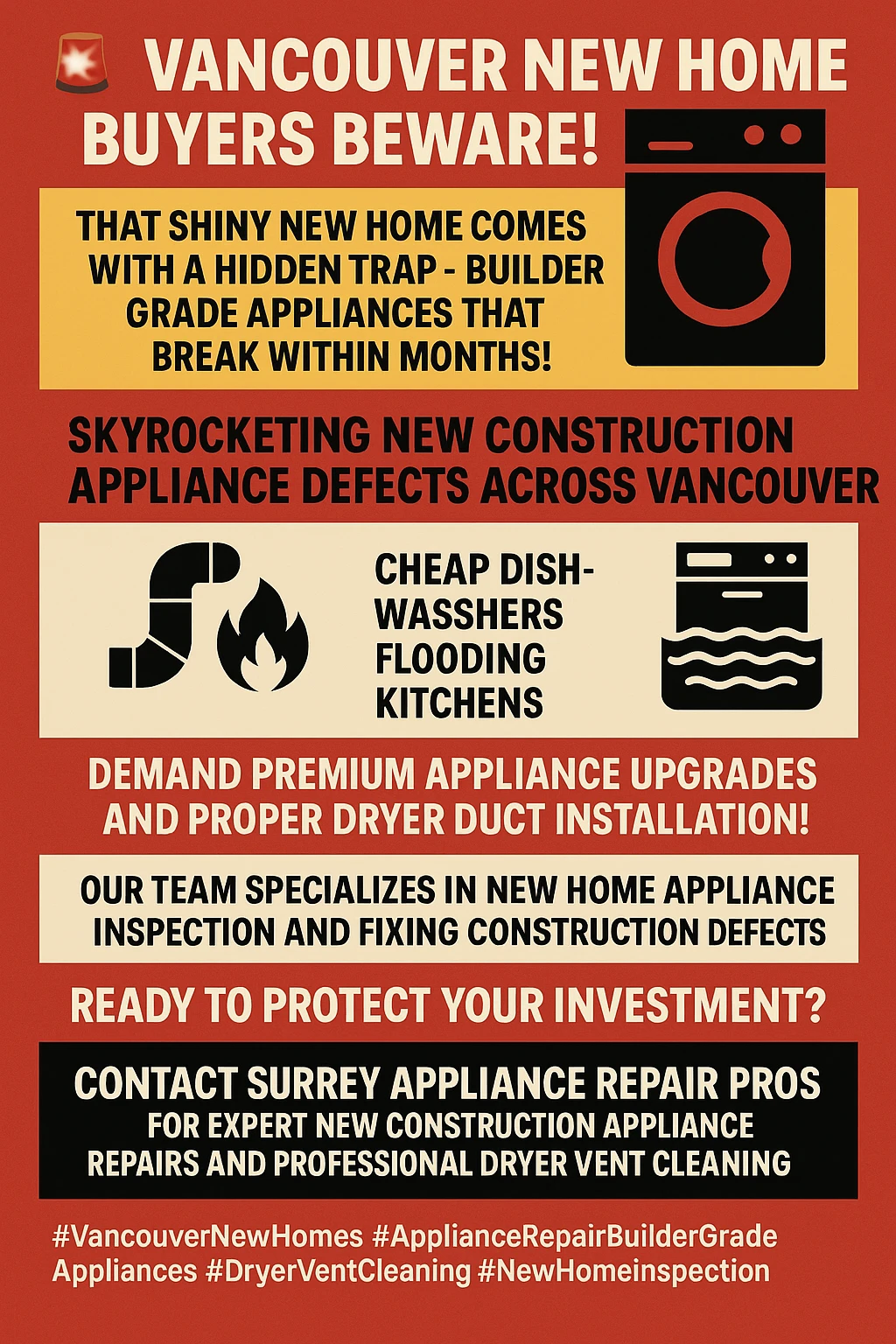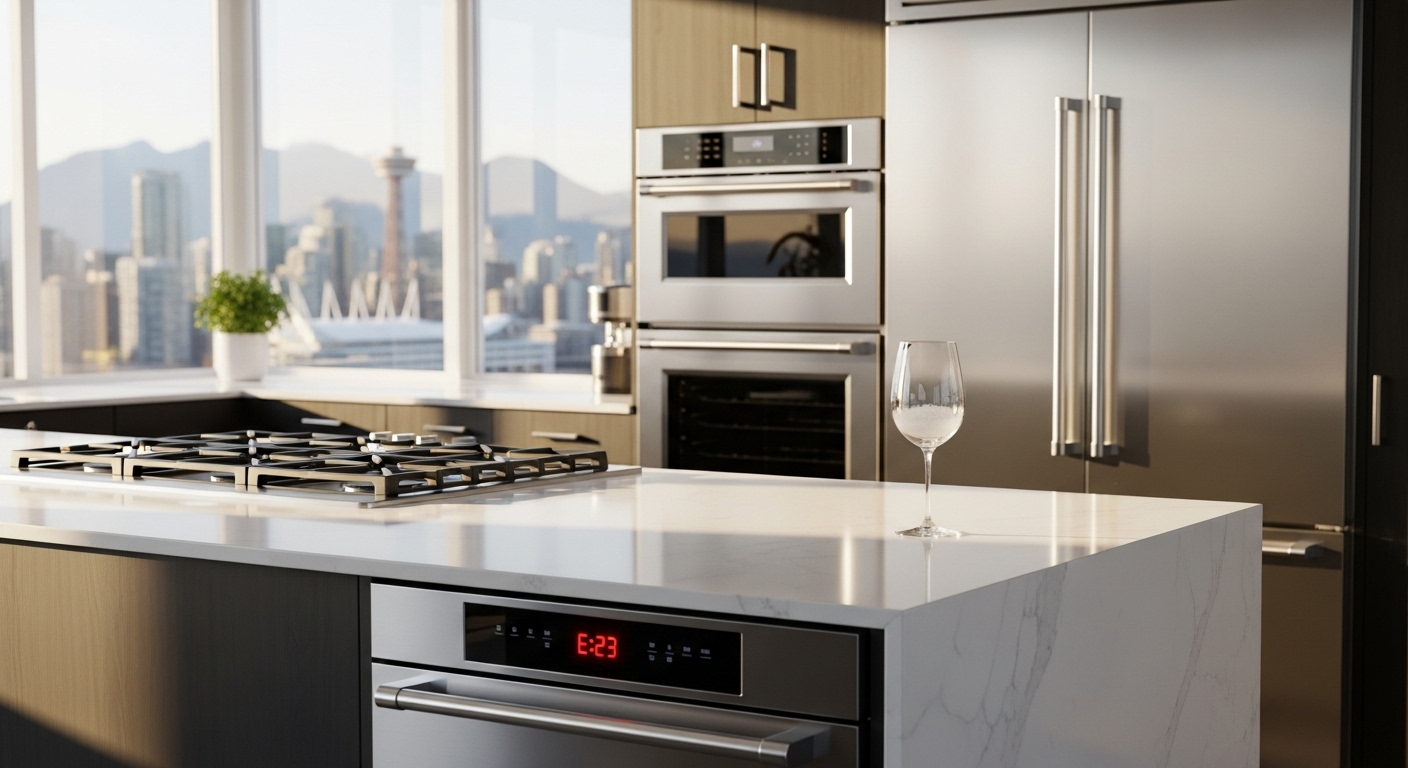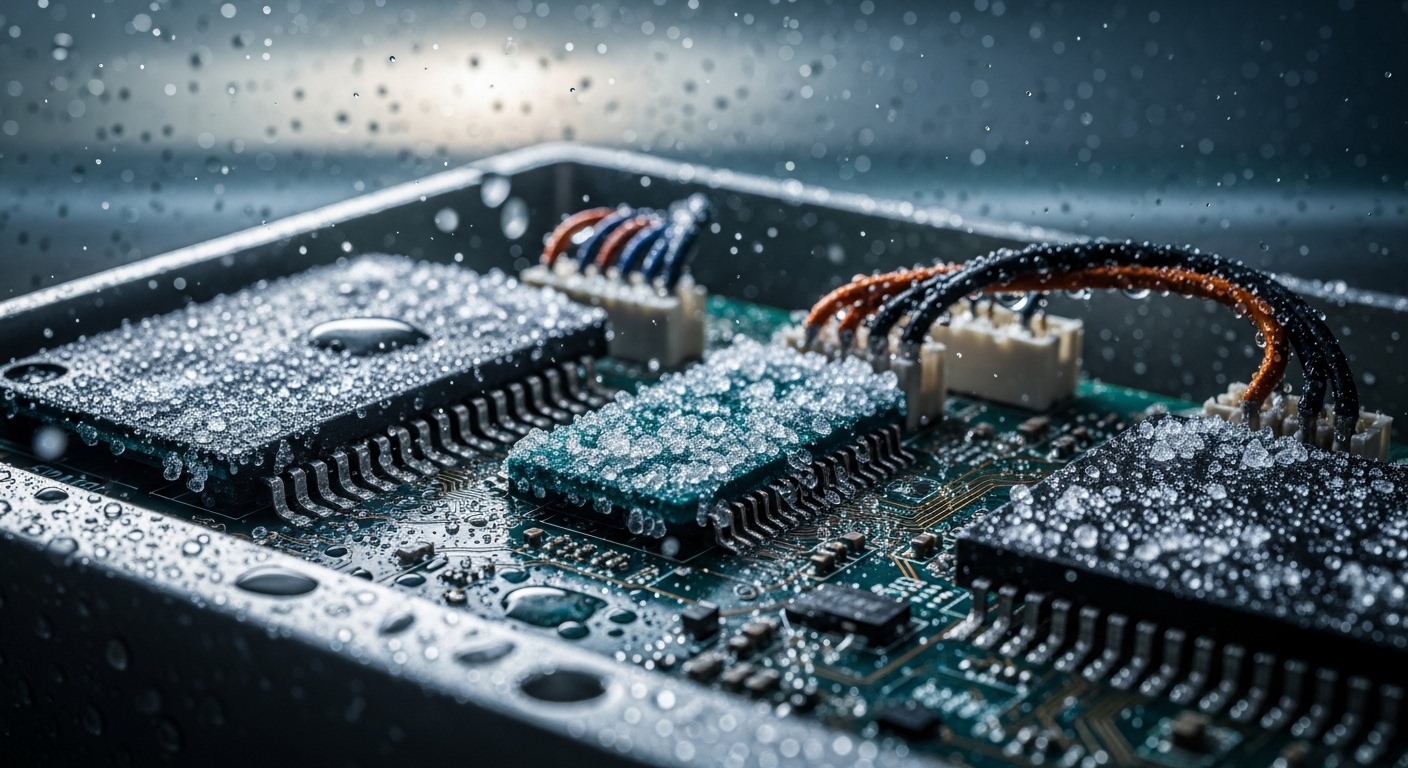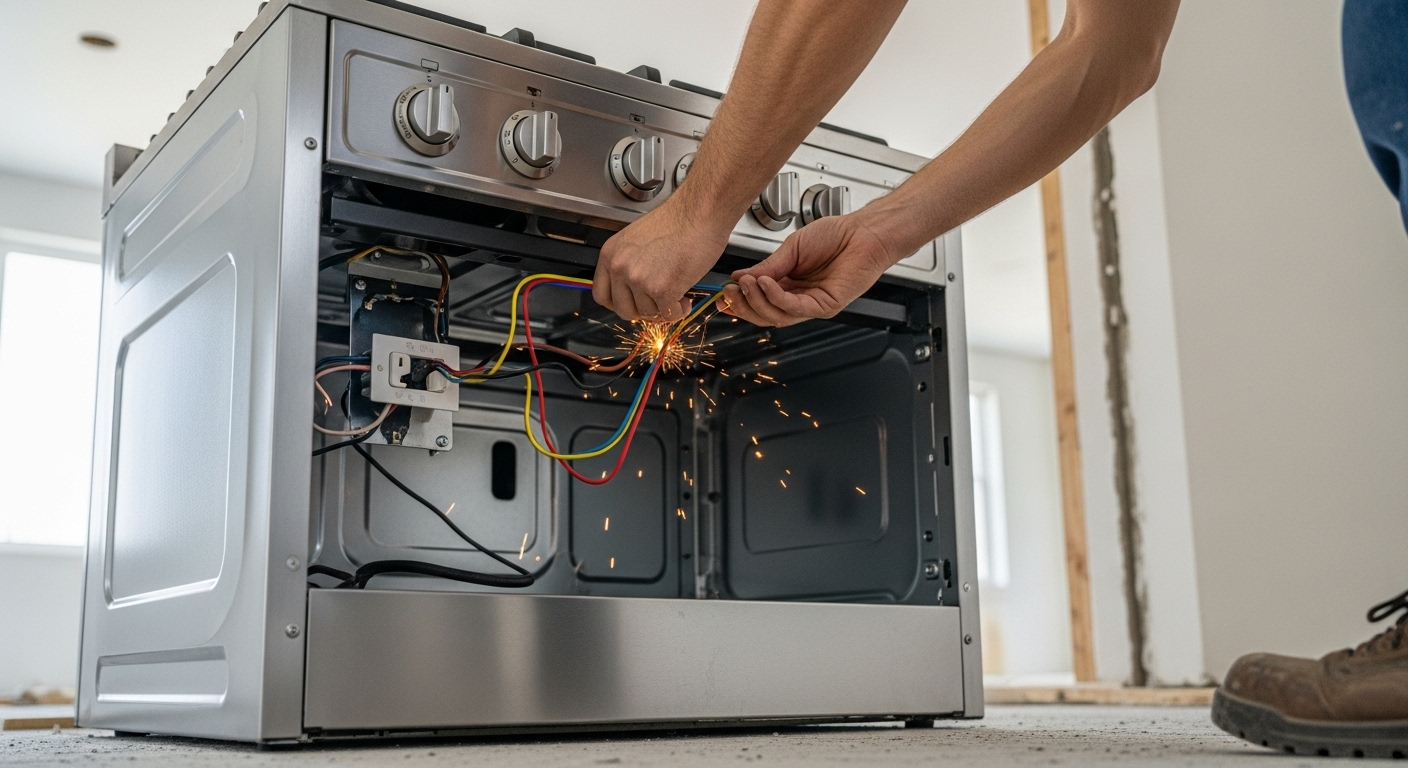Wondering why your shiny new Vancouver townhouse came with appliances that started acting up just three months after moving in? The truth is, Vancouver’s new construction boom has created a perfect storm of climate challenges, installation shortcuts, and hidden warranty traps that can turn your dream home into an appliance nightmare faster than you can say “builder grade.” Picture this: you’ve just dropped $950,000 on that gorgeous new condo in Burnaby, complete with stainless steel appliances that gleam under the LED lighting. Everything looks Instagram-perfect until your dishwasher starts leaving chalky residue on your wine glasses, mysterious error codes flash on the washing machine display, and that beautiful range hood sounds like it’s trying to take flight every time you cook dinner. What seemed like isolated bad luck is actually the predictable result of Vancouver’s unique challenges systematically attacking poorly protected appliances in ways that most homeowners never see coming. The harsh reality is that Vancouver new home buyers face a triple threat that other Canadian cities simply don’t experience. Our coastal climate creates aggressive salt air corrosion, our construction boom means appliances get installed weeks before possession (exposed to dust and electrical chaos), and our complex building codes create warranty loopholes that builders exploit to avoid responsibility. Understanding these hidden traps isn’t just about avoiding repair bills – it’s about protecting a substantial investment while ensuring your family’s daily routines aren’t disrupted by preventable appliance failures that could cost you thousands in premiums repairs and food spoilage. The financial implications extend far beyond simple replacement costs. When your refrigerator fails during Vancouver’s humid summer months, you’re looking at $500-1,500 in repairs plus $200-800 in spoiled groceries within just 48 hours. Meanwhile, that “premium” appliance package you upgraded to might have warranties that are already voided due to installation mistakes made before you even took possession of your new home.
Key Outtakes:
- Builder grade appliances in Vancouver fail 30% more frequently than premium models due to coastal climate exposure and construction-phase damage
- Installation mistakes void more warranties than manufacturing defects, with electrical connection errors accounting for nearly 40% of rejected warranty claims in Vancouver
- New construction appliances are often installed weeks before possession, exposing them to dust, vibrations, and electrical fluctuations that cause premature failure
- Vancouver’s building codes and strata regulations create warranty complications that don’t exist in other markets
- Professional pre-possession inspection can identify 85% of appliance issues before you take ownership and lose negotiating power

The Hidden Reality of Builder Grade Appliances in Vancouver New Homes

Let’s talk about what you’re actually getting when that sales rep gets all excited about the “included appliance package” in your new Vancouver home. Builder grade appliances are essentially medium grade products that production builders can get at the best price-point-to-quality ratio, but here’s the kicker – the main difference between builder grade and retail versions often comes down to marketing, labeling, availability, and distribution rather than actual quality differences. This doesn’t mean builder grade is automatically inferior, but it does mean you’re getting products specifically chosen for bulk purchasing power rather than performance or longevity in Vancouver’s challenging climate. Builders buy thousands of units at a time to negotiate rock-bottom prices, but they’re not necessarily considering whether that dishwasher can handle our hard water or if that range hood can effectively clear moisture in our humid environment. The focus is purely on meeting building code requirements at the lowest possible cost. The typical new home appliance package includes an over-the-range microwave hood combo, standalone gas or electric range, and dishwasher, but cleverly excludes washers, dryers, and small appliances that homeowners need to purchase separately. This strategic packaging allows builders to advertise “fully equipped kitchens” while pushing the most expensive and climate-sensitive appliances onto buyers who often don’t realize they’re making these purchases during the stressful moving period when they have the least negotiating power. What makes this particularly tricky in Vancouver is that our coastal environment demands higher-quality components than standard builder grade typically provides. Salt air and humidity create conditions where a cheap door seal or basic electronic control board that might last eight years in Calgary will fail in five years here. When builders choose appliances based purely on initial cost rather than total cost of ownership in our specific climate, they’re essentially passing future repair and replacement expenses onto homeowners who had no input in the selection process. The upgrade pricing structure makes the situation even more complex. When builders offer appliance upgrades, they roll these costs into your mortgage, spreading payments over 30 years instead of requiring immediate cash. While this can make quality upgrades more affordable from a cash flow perspective, the premium pricing often exceeds what you’d pay sourcing materials and labor yourself. The trade-off is convenience and warranty coordination versus potentially significant cost savings and product choice.
Vancouver’s Climate Creates Unique Appliance Challenges

Vancouver’s position between the Pacific Ocean and the Coast Mountains isn’t just great for Instagram photos – it creates a uniquely hostile environment for home appliances that most manufacturers never consider when designing their products. Our coastal location means appliances are constantly exposed to salt air that acts like a slow-motion wrecking ball on metal components, gradually corroding internal wiring, circuit boards, and mechanical connections in ways that are nearly impossible to prevent. The science behind this destruction is both fascinating and terrifying. Salt particles don’t just stay at the waterfront – they travel surprisingly far inland, especially during our infamous winter storm seasons. Homes in Richmond, Burnaby, and even parts of Surrey experience salt air penetration that reaches internal appliance components through normal ventilation systems. Unlike simple surface rust that you might wipe away, this salt-induced corrosion attacks the places you can’t see or reach, where repairs become prohibitively expensive. Our humidity levels create additional challenges that compound the salt air problem. Vancouver’s persistent moisture creates the perfect breeding ground for mold and mildew, particularly in front-loading washing machines, and provides the perfect medium for those salt-induced electrochemical reactions to occur continuously rather than just during obvious storm events. Temperature fluctuations unique to our coastal climate create stress patterns that gradually compromise appliance integrity through repeated expansion and contraction cycles. While other Canadian cities experience predictable seasonal changes, Vancouver’s weather subjects kitchen and laundry equipment to constant thermal cycling that causes rubber seals to develop micro-cracks, metal joints to loosen, and plastic components to become brittle over time. These seemingly minor changes accumulate until they result in sudden, catastrophic failures that typically occur just outside warranty periods. The refrigerators struggle particularly hard in our environment because they have to work overtime to maintain cool temperatures when the ambient humidity is high. This extra workload doesn’t just increase energy consumption – it puts tremendous stress on compressors and cooling systems that weren’t designed to operate in these conditions continuously. Meanwhile, dishwashers face Vancouver’s hard water conditions that cause mineral buildup in pumps and spray arms at rates that can void warranties if proper filtration isn’t installed during initial setup. What makes this situation particularly insidious is that the damage accumulates gradually and often goes unnoticed until too late. By the time homeowners recognize that their appliances are underperforming due to climate damage, the warranty period has often expired and the cost of repairs approaches or exceeds replacement value.
Installation Problems That Void Warranties Before You Move In

Here’s where things get really frustrating for Vancouver new home buyers: most appliance failures aren’t caused by manufacturing defects – they’re caused by installation mistakes that void your warranty before you’ve even moved in. The transition from builder-grade electrical systems to modern appliance requirements creates a minefield of potential problems that can instantly invalidate warranty coverage, and many contractors treat installation requirements as suggestions rather than mandatory warranty conditions. The most common electrical mistake involves using inadequate circuits or connections for modern appliances. Smart refrigerators, induction cooktops, and high-efficiency washing machines often require dedicated circuits with specific amperage ratings that go beyond basic building code minimums. When contractors simply plug appliances into existing outlets without verifying electrical compatibility, it creates power quality issues that damage sensitive electronic components while giving manufacturers legitimate grounds to deny warranty claims. Vancouver’s building codes add another layer of complexity that many installers overlook. The city requires specific types of electrical connections for certain appliances, and failure to meet

